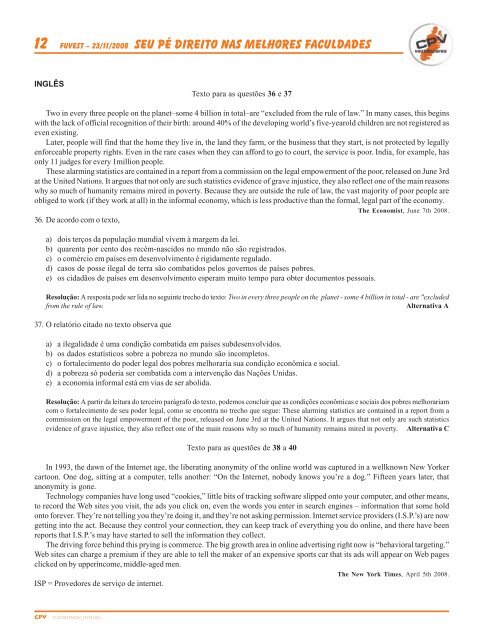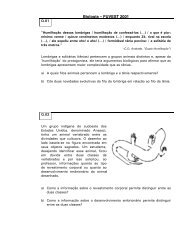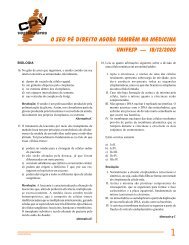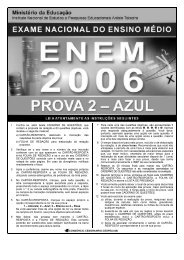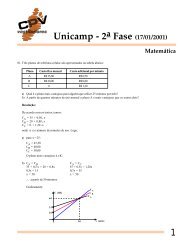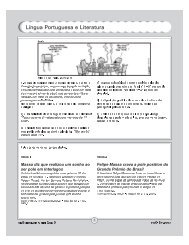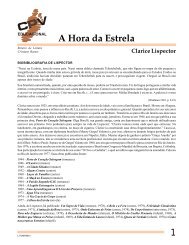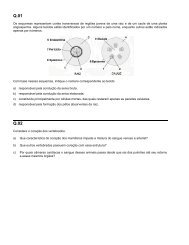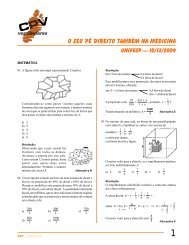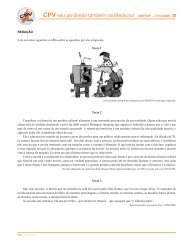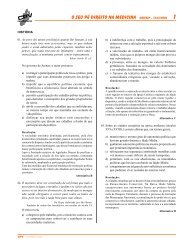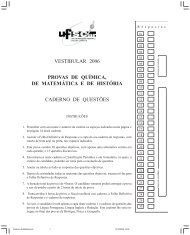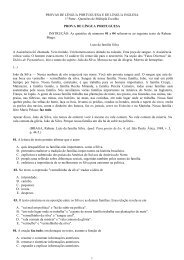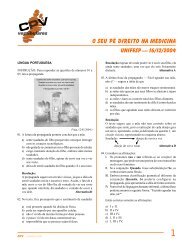FUVEST – 23/11/2008 Seu pé direito nas melhores Faculdades - CPV
FUVEST – 23/11/2008 Seu pé direito nas melhores Faculdades - CPV
FUVEST – 23/11/2008 Seu pé direito nas melhores Faculdades - CPV
Create successful ePaper yourself
Turn your PDF publications into a flip-book with our unique Google optimized e-Paper software.
12<br />
INGLÊS<br />
<strong>FUVEST</strong> <strong>–</strong> <strong>23</strong>/<strong>11</strong>/<strong>2008</strong> <strong>Seu</strong> <strong>pé</strong> <strong>direito</strong> <strong>nas</strong> <strong>melhores</strong> <strong>Faculdades</strong><br />
<strong>CPV</strong> fuv081fnov_inteira<br />
Texto para as questões 36 e 37<br />
Two in every three people on the planet<strong>–</strong>some 4 billion in total<strong>–</strong>are “excluded from the rule of law.” In many cases, this begins<br />
with the lack of official recognition of their birth: around 40% of the developing world’s five-yearold children are not registered as<br />
even existing.<br />
Later, people will find that the home they live in, the land they farm, or the business that they start, is not protected by legally<br />
enforceable property rights. Even in the rare cases when they can afford to go to court, the service is poor. India, for example, has<br />
only <strong>11</strong> judges for every 1million people.<br />
These alarming statistics are contained in a report from a commission on the legal empowerment of the poor, released on June 3rd<br />
at the United Nations. It argues that not only are such statistics evidence of grave injustice, they also reflect one of the main reasons<br />
why so much of humanity remains mired in poverty. Because they are outside the rule of law, the vast majority of poor people are<br />
obliged to work (if they work at all) in the informal economy, which is less productive than the formal, legal part of the economy.<br />
The Economist, June 7th <strong>2008</strong>.<br />
36. De acordo com o texto,<br />
a) dois terços da população mundial vivem à margem da lei.<br />
b) quarenta por cento dos recém-<strong>nas</strong>cidos no mundo não são registrados.<br />
c) o comércio em países em desenvolvimento é rigidamente regulado.<br />
d) casos de posse ilegal de terra são combatidos pelos governos de países pobres.<br />
e) os cidadãos de países em desenvolvimento esperam muito tempo para obter documentos pessoais.<br />
Resolução: A resposta pode ser lida no seguinte trecho do texto: Two in every three people on the planet - some 4 billion in total - are "excluded<br />
from the rule of law. Alternativa A<br />
37. O relatório citado no texto observa que<br />
a) a ilegalidade é uma condição combatida em países subdesenvolvidos.<br />
b) os dados estatísticos sobre a pobreza no mundo são incompletos.<br />
c) o fortalecimento do poder legal dos pobres melhoraria sua condição econômica e social.<br />
d) a pobreza só poderia ser combatida com a intervenção das Nações Unidas.<br />
e) a economia informal está em vias de ser abolida.<br />
Resolução: A partir da leitura do terceiro parágrafo do texto, podemos concluir que as condições econômicas e sociais dos pobres melhorariam<br />
com o fortalecimento de seu poder legal, como se encontra no trecho que segue: These alarming statistics are contained in a report from a<br />
commission on the legal empowerment of the poor, released on June 3rd at the United Nations. It argues that not only are such statistics<br />
evidence of grave injustice, they also reflect one of the main reasons why so much of humanity remains mired in poverty. Alternativa C<br />
Texto para as questões de 38 a 40<br />
In 1993, the dawn of the Internet age, the liberating anonymity of the online world was captured in a wellknown New Yorker<br />
cartoon. One dog, sitting at a computer, tells another: “On the Internet, nobody knows you’re a dog.” Fifteen years later, that<br />
anonymity is gone.<br />
Technology companies have long used “cookies,” little bits of tracking software slipped onto your computer, and other means,<br />
to record the Web sites you visit, the ads you click on, even the words you enter in search engines <strong>–</strong> information that some hold<br />
onto forever. They’re not telling you they’re doing it, and they’re not asking permission. Internet service providers (I.S.P.’s) are now<br />
getting into the act. Because they control your connection, they can keep track of everything you do online, and there have been<br />
reports that I.S.P.’s may have started to sell the information they collect.<br />
The driving force behind this prying is commerce. The big growth area in online advertising right now is “behavioral targeting.”<br />
Web sites can charge a premium if they are able to tell the maker of an expensive sports car that its ads will appear on Web pages<br />
clicked on by upperincome, middle-aged men.<br />
The New York Times, April 5th <strong>2008</strong>.<br />
ISP = Provedores de serviço de internet.
<strong>CPV</strong> fuv081fnov_inteira<br />
<strong>Seu</strong> <strong>pé</strong> <strong>direito</strong> <strong>nas</strong> <strong>melhores</strong> <strong>Faculdades</strong> <strong>FUVEST</strong> <strong>–</strong> <strong>23</strong>/<strong>11</strong>/<strong>2008</strong><br />
38. As personagens dos quadrinhos, mencionadas no texto, se vangloriam de<br />
a) sua alegria de viver.<br />
b) seu anonimato.<br />
c) sua capacidade de navegar na internet.<br />
d) seu mundo longe das telas.<br />
e) sua vida simples, como a de um cão.<br />
Resolução: Pode-se ler a resposta no seguinte trecho do texto:<br />
the liberating anonymity of the online world was captured in a well-known New Yorker cartoon. One dog, sitting at a computer, tells another:<br />
"On the Internet, nobody knows you're a dog."<br />
Alternativa B<br />
39. Segundo o texto, os provedores de internet<br />
a) mantêm sigilo sobre os hábitos de navegação e comportamentos dos usuários.<br />
b) têm dificuldade de bloquear a invasão de programas espiões em nossos computadores.<br />
c) pedem autorização para indicar o endereço do usuário a terceiros, como sites de comércio eletrônico.<br />
d) obtêm dados a respeito de nossas ações na internet, havendo suspeita de que eles os vendem.<br />
e) cobram pela utilização de alguns sites de vendas, a eles conveniados.<br />
Resolução:<br />
Encontra-se a resposta no trecho que segue: Because they control your connection, they can keep track of everything you do online, and there<br />
have been reports that I.S.P.'s may have started to sell the information they collect. Alternativa D<br />
40. De acordo com o texto, a evolução da internet nos últimos quinze anos permite concluir que<br />
a) o foco principal do comércio eletrônico são homens de meia idade.<br />
b) a liberdade de expressão é o bem mais cultuado no mundo digital.<br />
c) a supressão de “cookies” é um grande problema das empresas de tecnologia.<br />
d) as buscas dos usuários na internet são previsíveis.<br />
e) a vigilância a que somos submetidos é resultado de interesses comerciais.<br />
Resolução:<br />
Pode-se ler a resposta no trecho que segue:<br />
The driving force behind this prying is commerce.<br />
Comentário do <strong>CPV</strong><br />
13<br />
Alternativa E<br />
A prova de Inglês da Fuvest 2009 apresentou 2 textos de publicações recentes (The Economist, 7 de Junho de <strong>2008</strong>, e The New York Times,<br />
5 de abril de <strong>2008</strong>) e cobrou ape<strong>nas</strong> questões de compreensão de texto. No entanto, o estudo de gramática continua necessário, para que o aluno<br />
possa atingir o nível de compreensão exigido neste exame. Ainda que as alternativas tenham, mais uma vez, sido cobradas em Português, o<br />
vocabulário exigido dos alunos no vestibular 2009 em relação a <strong>2008</strong> foi muito mais elaborado, com elevado nível de exigência. Além disso, tem sido<br />
necessário que os alunos se mantenham sempre atualizados com a leitura das publicações citadas, a fim de que possam enfrentar com segurança esta<br />
prova.


